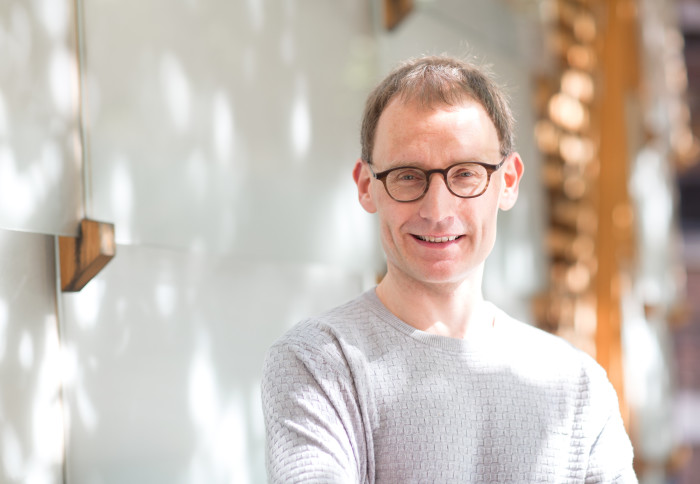Theoretical physics to pandemic modelling: Neil Ferguson on his life in science

The head of the College’s COVID-19 Response Team is the latest Imperial scientist to appear on BBC Radio 4’s Life Scientific.
In the interview with Professor Jim Al-Khalili, Professor Neil Ferguson looked back on his career to date, from a PhD in theoretical physics and learning to code, to modelling disease outbreak.
From modelling subatomic particles to modelling viruses
Professor Ferguson's academic life began researching string theory, an area of theoretical physics, at Oxford University, before working on statistical mechanics. An inspiring talk on the AIDS epidemic by Lord Robert May, a physicist turned biologist, showed Professor Ferguson how the work he was doing could be applied to the study of epidemics.
His early days working in epidemiology saw him model measles vaccination strategies, before moving on to BSE (Mad Cow Disease) and foot and mouth disease. In the years to follow, he worked on other emerging diseases such as SARS and the swine flu pandemic, and pandemic preparedness.
Professor Ferguson first started to work on the novel coronavirus when he heard of a case in Thailand in early January - to him this meant the epidemic in Wuhan had to be much larger than what was being reported at the time. He assembled a team immediately: “We concluded within a couple of weeks that it must be spreading predominantly from person to person.” By February, it was clear to the team that they were dealing with a pandemic. “The sheer level of seeding of infection into multiple countries was at a scale which made myself, and I think everybody else, […] realise that it was almost impossible that we would contain it.”
Advising policymakers
On advising government and policymakers, he said: “There’s always a very fuzzy boundary between science advice, particularly when it’s science advice on what the likely impact of different policy options will be, and stepping over that line to policy advice. […] In reality, what scientists on SAGE do is not tell government what to do, but to give a range of options.”
In reality, what scientists on SAGE do is not tell government what to do, but to give a range of options. Professor Neil Ferguson Imperial College London COVID-19 Response Team
Discussing the limitations of disease modelling, he added: “There is always a tendency with policymakers to view modelling as almost an alternative to data. There’s always a temptation with policymaker to ask you “what would be effective? Closing pubs... reopening pubs?” We don’t have a good enough understanding of transmission, and of human behaviour, to build a mathematical model which can give you a reliable answer to that question. We can talk in much broader brushstrokes.”
“The overall view of what we were facing, what the policy options were, and what the consequences would be, was a consensus view shared by many different academic groups across the country.”
Guided, but not led by, the science
Talking about public perception of scientists during the pandemic, he said: “There is a shared responsibility for what’s gone on this year. We were not the policymakers, but we had influence in terms of the scientific analysis we presented and the work we did, all of the scientists who were feeding in.
“I think you can be guided by the science, but not led by it.”
Professor Ferguson voiced his concerns about the risk of media interactions leading to scientists being seen as the spokesperson for the scientific community, but added: “I do think though that scientists have a responsibility to step up and communicate what they’re doing, even more so if what they’re doing affects people’s lives as immediately as work on COVID-19 has.”
Scientific lives
On BBC Radio 4’s Life Scientific, Professor Jim Al-Khalili talks to leading scientists about their life and work, finding out what inspires and motivates them and asking what their discoveries might do for us in the future. Professor Ferguson joins a long list of over 10 academics and researchers from the Imperial community to have featured on the programme.
Most recently, Professor Frank Kelly from Imperial’s School of Public Health discussed his pioneering work in the field of air pollution. He was one of the first scientists to prove that toxic particles in the air can damage our lungs and set up an extensive network of monitoring stations in London. In recent months he has been monitoring the effect of the COVID-19 pandemic on air pollution. While there have been less vehicles on the road he says, there are still many polluting activities taking place, such as people heating their homes or cooking. “It is a fantastic natural experiment […] We really must use this opportunity to understand what the implications are of certain sources,” he said.

Back in 2017, Professor Michele Dougherty from the Department of Physics appeared on the programme to discuss why she diverted the Cassini mission to Saturn and how it led to an astonishing discovery.
Other members of the Imperial community to have featured on the programme include former co-director of Imperial’s Grantham Institute, Professor Jo Haigh, on the climate, Professor Sanjeev Gupta on his love of exploring exotic terrains, from the foothills of the Himalayas to the red deserts of Mars; and Professor Chris Toumazou on inventing medical devices.
Article text (excluding photos or graphics) © Imperial College London.
Photos and graphics subject to third party copyright used with permission or © Imperial College London.
Reporter
Joanna Wilson
Communications Division